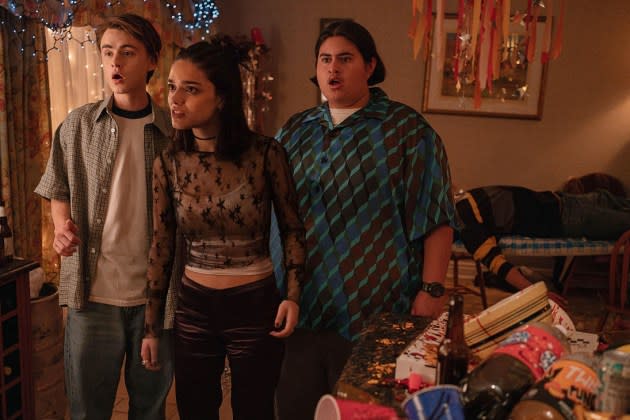‘Y2K’ Review: Rachel Zegler in a Sci-Fi Comedy That Offers Lots of ’90s Nostalgia, but Not Much Else

The shrill drone of dial-up is a defining feature of Kyle Mooney’s directorial debut Y2K, even if the actual sound plays only a few times throughout the comedian’s brash and lopsided film. The jagged melody of low-toned hums and static interludes not only captures the possibility of the late ’90s and early aughts; it also represents the anxiety provoked by the turn of the new millennium.
In the years leading up to the year 2000, rumors swirled about a bug that would wreak havoc on computer systems around the world. The extent of this potential damage was never entirely clear — millions of dollars could be lost, total mayhem might ensue — but the real panic it inspired revealed how reliant humans had become on technology to facilitate all aspects of their lives. In Y2K, Mooney and his co-writer Evan Winter wonder what would happen if the threat had been real.
More from The Hollywood Reporter
'Babes' Review: Ilana Glazer and Michelle Buteau Shine in Pamela Adlon's Charming Maternal Romp
'Azrael' Review: Samara Weaving in a High-Concept Horror Flick That's Frighteningly Familiar
Premiering at SXSW, this A24 joint is an ambitious science-fiction comedy that, like the rumor driving it, doesn’t live up to its own hype. The film follows a group of high-school juniors navigating the apocalyptic conditions imposed by a mass machine revolt. Mooney eagerly mines the trove of Y2K cultural references to shape a narrative fine-tuned to a particular millennial sensibility, but struggles to meet the very low demands of its internal logic. It’s a film of assured performances — with an especially strong turn from Julian Dennison — and a handful of sharp twists in search of a better story.
Y2K, like many of its teen comedy forebears, opens with the pursuit of sex. It’s New Year’s Eve, 1999, and Eli, a meek high-school junior (Jaeden Martell) and his best friend Danny (the scene-stealing Dennison) want to turn their luck around with girls and their popularity. Mooney smartly begins with Eli loading the internet and logging onto AOL messenger, where he talks to Danny and his crush Laura (Rachel Zegler) in separate chats. It’s a bit of nostalgic bait and an acknowledgement of how, for teenagers especially, the internet will always be a playground for experimenting with personality and an extension of the adolescent quest to shape an identity. Here, Laura, a cool girl with a passion for coding, can indulge in her nerdy interests safe from the judgment of her friends. Eli can pretend he’s not awkward and Danny, like the best class clowns, works out his material.
The beginning of Y2K is a kitchen sink of early aughts internet nostalgia that revels in the simplicity of static Web 1.0 pages and finds humor in the glacial pace of the then high-speed internet. Mooney stages a day in the life for Eli and Danny, following the pair as they pass neighbors practicing the Macarena, smoke weed with their friend Garrett (Mooney), who works at the video rental place, and run into Laura and her cool friends at the gas station convenience store. Walkmen, camcorders, VHS tapes, pixelated videos of Bill Clinton and other signifiers of that period are deployed with the deftness of a cultural insider. If nothing else, the merchandise for the publicity campaign for Y2K will be good.
After some consideration and a bottle of vodka, Eli and Danny decide to attend the big New Year’s Eve bash Laura mentioned to them earlier. The house party becomes another stage for indulging in ’90s nostalgia. “Everyone is here,” the friends remark upon entering the two-story suburban home. Mooney uses this opportunity to cycle through the different subgroups of the era, from the jocks to the underground hip-hop heads and more. Dennison truly shines in these scenes, making Danny more than Eli’s foil by flexing his comedic timing and playing up his character’s endearing charm. There’s a warmth to Danny’s interactions with Eli that suggests the New Zealand transplant means well even when his plans backfire.
The action kicks off at the house party. When midnight strikes, people begin to die and their gruesome (and often inventive) murders expose Y2K’s creaks. It becomes clear that this is the kind of movie that will rely on style and shock to mask the thinness of its central narrative. As bodies fall around them and blood stains the alabaster walls, Danny and Eli escape with an ad hoc group that includes Laura; aspiring white conscious rapper CJ (Funny Pages’ Daniel Zolghadri) and sharp-tongued and reliable documentarian Ash (Lachlan Watson); and their bully (played by Booksmart’s Eduardo Franco).
This motley crew has potential, but Y2K miscalculates the impact of certain character deaths. There’s something to the shock of killing a story’s darlings, but the film doesn’t offer much in the way of internal world-building (do the machines really want to take over because humans are just…annoying?) or its central love story to make up for the holes left by these disappearances.
The novelty eventually wears off, especially when Eli’s computer haunts the crew one moment and is meant to be a potential ally in the next. The contrivance of certain parts of the narrative — Laura’s hacking techniques, the introduction of Fred Durst as Fred Durst — derail the story, turning the latter half of the film into a hodge-podge of random encounters. The result is a film with undeniable flair that’s nevertheless too unfocused to appreciate.
Best of The Hollywood Reporter

 Yahoo News
Yahoo News 